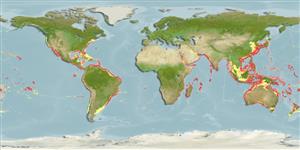Common names from other countries
Environment: milieu / climate zone / depth range / distribution range
Sinh thái học
Biển Cùng sống ở rạn san hô; Mức độ sâu 40 - 400 m (Ref. 9335), usually 165 - 200 m (Ref. 9335). Subtropical; 46°N - 56°S, 25°E - 5°W
Circumglobal in tropical and tropically influenced seas. Indo-Pacific: South Africa to the central Pacific islands, north to Japan and Korea, south to southeastern Australia. Eastern Pacific: Baja California to Peru. Western Atlantic: Nova Scotia, Canada (Ref. 47377) and New Jersey, USA to probably Argentina (Ref. 11441). Abundant at St. Helena but no substantiated records in eastern Atlantic from the African coastal region or the Canary Islands. Often misidentified as Cookeolus boops, a junior synonym of Heteropriacanthus cruentatus (Ref. 11441).
Bộ gần gũi / Khối lượng (Trọng lượng) / Age
Maturity: Lm ? range ? - ? cm
Max length : 69.0 cm NG con đực/không giới tính; (Ref. 89467); common length : 30.0 cm TL con đực/không giới tính; (Ref. 5217); Khối lượng cực đại được công bố: 5.0 kg (Ref. 89467); Tuổi cực đại được báo cáo: 9 các năm (Ref. 5403)
Các tia vây lưng cứng (tổng cộng) : 10; Các vây lưng mềm (tổng cộng) : 12 - 14; Tia cứng vây hậu môn: 3; Tia mềm vây hậu môn: 12 - 14. Last (10th) dorsal spine twice the length of the second (Ref. 48635).
Found on hard bottoms to a depth of about 400 m and reported to be moderately common at depths of 165 to 260 m in association with rocky holes and ledges; preferably with rich invertebrate growth such as sponges and soft corals (Ref. 48635). Benthopelagic (Ref. 58302). Juveniles pelagic (Ref. 9335, 9563). Feed on pelagic crustaceans (Ref. 9335). Probably spawns in the Caribbean from May to September. Solitary (Ref 90102).
Life cycle and mating behavior
Maturities | Sự tái sinh sản | Spawnings | Egg(s) | Fecundities | Ấu trùng
Starnes, W.C., 1988. Revision, phylogeny and biogeographic comments on the circumtropical marine percoid fish family Priacanthidae. Bull. Mar. Sci. 43(2):117-203. (Ref. 5403)
IUCN Red List Status (Ref. 130435)
CITES (Ref. 128078)
Not Evaluated
Threat to humans
Harmless
Human uses
Các nghề cá: Tính thương mại; Bể nuôi cá: Tính thương mại
Các công cụ
Special reports
Download XML
Các nguồn internet
Estimates based on models
Preferred temperature (Ref.
115969): 12.2 - 21.8, mean 15.6 (based on 136 cells).
Phylogenetic diversity index (Ref.
82804): PD
50 = 1.0000 [Uniqueness, from 0.5 = low to 2.0 = high].
Bayesian length-weight: a=0.02089 (0.01096 - 0.03984), b=2.89 (2.72 - 3.06), in cm Total Length, based on LWR estimates for this species & (Sub)family-body (Ref.
93245).
Mức dinh dưỡng (Ref.
69278): 3.5 ±0.60 se; based on food items.
Thích nghi nhanh (Ref.
120179): Trung bình, thời gian nhân đôi của chủng quần tối thiểu là 1.4 - 4.4 năm (tmax=9).
Fishing Vulnerability (Ref.
59153): Low to moderate vulnerability (27 of 100).
